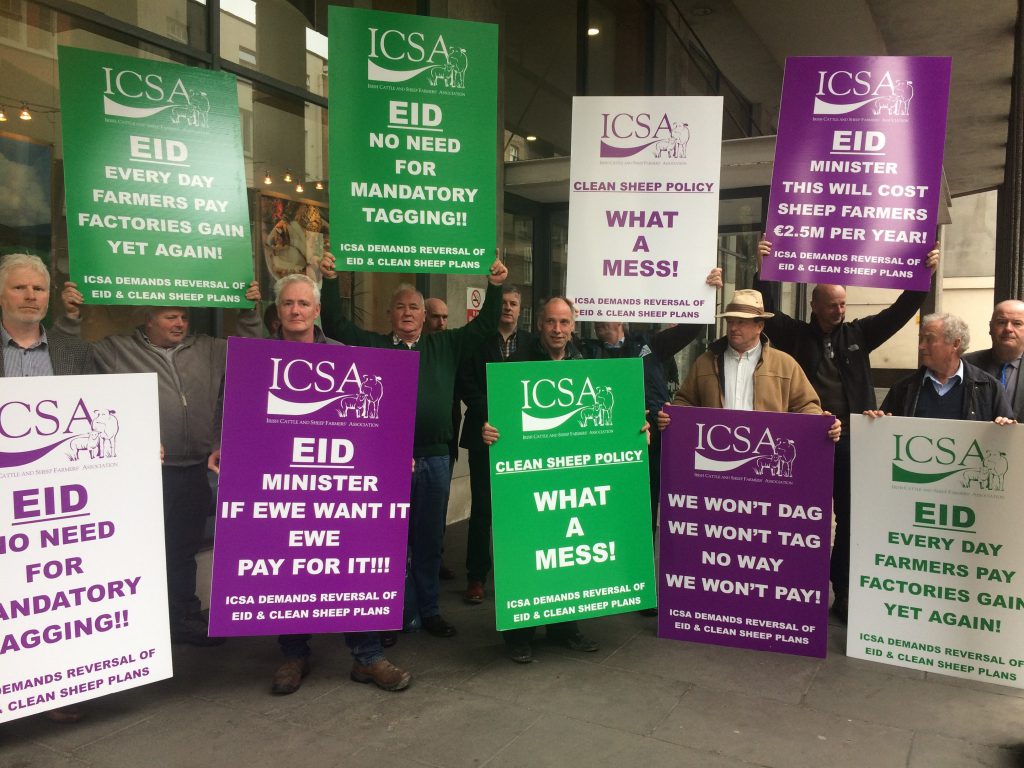The Sheep Committee of the Irish Cattle and Sheep Farmers’ Association (ICSA) held a protest today (Monday, May 14) at the Department of Agriculture headquarters to reflect “growing anger” among sheep farmers to new electronic identification (EID) tagging rules.
The rally was also held in response to concerns over the Clean Livestock Policy (CLP) for sheep.
ICSA sheep chairman John Brooks described Minister for Agriculture, Food and the Marine Michael Creed’s recent decision to impose mandatory EID tagging on lambs destined for factories as “the straw that broke the camel’s back”.
The ICSA is calling for an “urgent meeting” with the minister to address these issues and to lobby him to go “back to the drawing board”.
There is neither rhyme nor reason to the minister’s decision to impose mandatory electronic tagging on lambs going direct to the factory. The traceability requirement is that they are tagged before they leave the farm.
“A few hours later, the lamb is processed with the ear disposed of and the costly electronic ear tag is in the skip,” he said.
Although the minister has stated that the lack of EID is an impediment to market access; the ICSA contends that the vast majority of the country’s lamb will continue to go to EU markets which are undersupplied.
“There is no need to add cost to our lamb for existing markets and the reality is that in the biggest EU market – France – lamb imports will always be discounted compared to native French lamb, regardless of what we put in lambs’ ears.
‘Making US inroads’
“The main marketing logic was allegedly for the US market; but this won’t be the first minister to talk up the potential of the US market in vain,” said Brooks.
If we can’t make inroads there with grass-fed beef, we are highly unlikely to fare much better with sheepmeat.
The ICSA claims that the decision will add some €2.5 million cost to sheep farmers, based on additional costs of €1/lamb and a throughput of some 2.5 million lambs per annum.
The association contends that the average profit per lamb is about €14, based on an annual average price of €100 or €4.80/kg over the past five years.
“It costs the average Teagasc profit monitor farmer €86 to produce a lamb. So when the minister adds €1 cost to a lamb producing €14 profit, he is imposing a 7% income cut. This compares badly with EU proposals to cut CAP [Common Agricultural Policy] direct payments by 4%.”
Although the minister has stated his intention to introduce a one-off support measure – up to a maximum of €50 per keeper – for the first purchase of EID tags, Brooks added that this proposal is “really rubbing farmers up the wrong way”.
“Does the minister really believe we can be bought off for €50? It doesn’t make up for a permanently-imposed cost leading to a 7% cut in sheep farmers’ profits. That’s on lowland farms. The situation is even worse for hill farmers who are being asked to fund an extra euro when selling store lambs from the hills that might only be worth €20-30,” he said.
All other sheep will require an EID tag set comprised of two tags – one conventional tag and a corresponding electronic tag. However, a conventional tag and an EID bolus will be permitted also.
The new EID rules will require that all sheep sold from October 1 onward must be identified electronically.
Clean Livestock Policy
The protest is also on the back of farmer anger over the Clean Livestock Policy (CLP) for sheep which, the ICSA contends, has been imposed without concern for the problems it has caused in factories this year.
“We need an urgent review of the implementation of the policy as we cannot allow a repeat of the chaos we have seen on occasion in factories with whole consignments of lambs being sent off for shearing.
It is incumbent on the department to pull all stakeholders together to develop a consensus on what will work in practice.
“It is especially important that Teagasc develop and trial systems of production that will ensure farmers can comply with requirements.
“Farmers need certainty and there is a lot of anger about the lottery of sending lambs in to a factory not knowing what will happen to them,” said Brooks.

